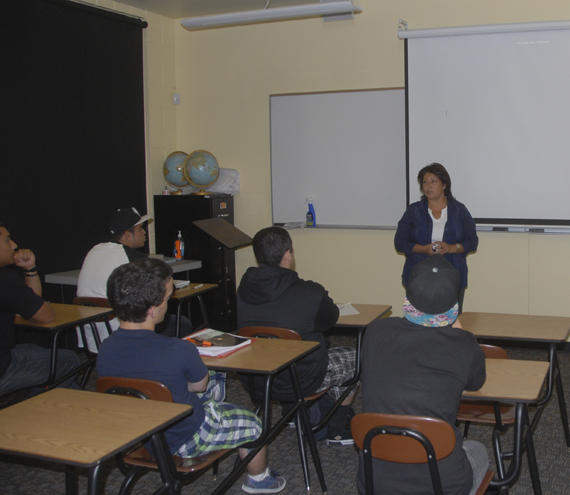
|
Cindy Harber with the organization Parents of Murdered Children talks about her son Josh who died in Phoenix, Arizona in 2002 after being shot outside a bar. |
Mother of murder victim talks
to class at Ventura College Santa Paula Campus
November 07, 2014
By Brian D. Wilson
Santa Paula News
Victimology: The study of the victims of crime and the psychological effects on them of their experience.
That’s one of the classes being held at the Santa Paula campus of Ventura College. It’s taught by Gilbert Lovio on Tuesday evenings. At the class he had three guest speakers. One of them was Cindy Harber with the organization Parents of Murdered Children. Her son Josh died in Phoenix, Arizona in 2002 after being shot outside a bar. He had been a member of the Ventura Hells Angels for about six months when the fatal shooting occurred. The shooter has yet to be caught. Harber worked as a mason and lived in Oak View. The murder is now a cold case and Mrs. Harber said, “I can’t stop trying to find out what happened.”
The evening started out with a presentation from Kathryn Benner with the Ventura County Restorative Justice Collaborative. According to the statement on the Collaborative’s Facebook page, “Restorative justice is an approach to justice that focuses on the needs of the victims and the offenders, as well as the involved community, instead of satisfying abstract legal principles or punishing the offender. Victims take an active role in the process, while offenders are encouraged to take responsibility for their actions”
Benner noted that under the normal criminal justice system crime is a violation of the law and the state. Under restorative justice crime is a violation of people and relationships. She also said that under criminal justice it requires the state to determine blame (guilt) and impose pain (punishment). Under restorative justice it involves victims, offenders and community members in an effort to put things right. She said under criminal justice the central focus is on offenders getting what they deserve. Under restorative justice the central focus is the victim’s needs and offender responsibility for repairing harm.
Mrs. Harber is a supporter of restorative justice and would like to meet her son’s killer face-to-face to ask him why? She said, “My biggest prayer is that I would not end up an angry, bitter person, full of hate and wanting my pound of flesh.” She added, “The bullet didn’t just hit Josh, it hit the whole family. It destroyed it.” She makes a similar presentation to young people at the California Youth Authority.
She said if she ever gets a chance to sit across from the killer she wants to be fully aware of how to do this. “I don’t want to go in ignorant so I can make the most of that opportunity, because sometimes there’s just that window of time,” she noted. “I want to know everything I can do. I want to know my rights. I don’t know what the future holds with this. I know what I’m going through now. It’s challenging.”
She said the grief doesn’t stop, “The mourning doesn’t stop.” She added, “There is no closure. It’s an ongoing thing.”
The victimology class studies a number of issues, including, the consequences of victimization, victim advocacy, intimate partner abuse, child abuse and victim impact statements, to name a few.



